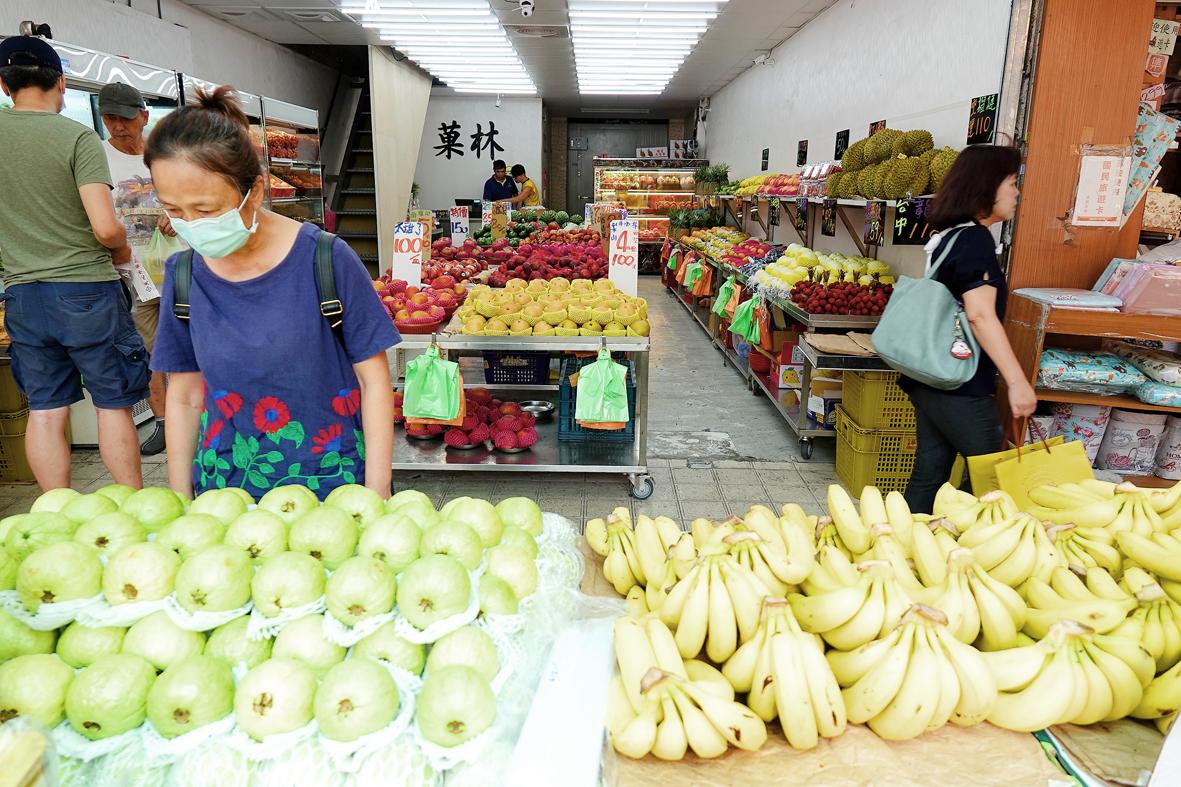The Directorate-General of Budget, Accounting and Statistics (DGBAS) yesterday said that it would release its producer price index (PPI) on a monthly basis starting next year to better capture movements in selling prices from domestic production and to stay with the global trend.
The agency said that it has finished compiling its latest PPI data and plans to present them to the quarterly review committee next month to update the nation’s GDP growth and per capita income.
DGBAS has relied on the wholesale price index (WPI) to track the cost of production for the past 40 years, while most economies worldwide favor PPI, widely considered an objective tool for adjusting prices in long-term purchasing agreements, it said.

Photo: CNA
Because prices fluctuate, long-term deals are difficult with only a single, fixed price for goods or supplies, so the purchasing business and the supplier typically include a clause in the contract that adjusts the cost by external indicators, such as PPI, it said.
It is time for the DGBAS to adjust and link up with the world after decades of guiding its inflation observations using the consumer price index and cost of production with WPI, DGBAS officials told Chinese-language media.
WPI reflects purchase costs and factory-gate prices, making its boundary less clear-cut in measuring production costs and GDP, the officials said.
PPI would limit its survey to domestic producers — exporters and importers — and omit trading companies and re-exporters, as trading firms are not manufacturers and re-exporters make a profit by processing foreign goods, they said.
DGBAS has long sought to compile PPI and replace WPI, but hesitated due to concerns over rules governing asset revaluations of profit-making organizations and WPI links to basic labor wages, the agency said.
As a result, WPI would continue with PPI, unless people mix them up, it said.

MULTIFACETED: A task force has analyzed possible scenarios and created responses to assist domestic industries in dealing with US tariffs, the economics minister said The Executive Yuan is tomorrow to announce countermeasures to US President Donald Trump’s planned reciprocal tariffs, although the details of the plan would not be made public until Monday next week, Minister of Economic Affairs J.W. Kuo (郭智輝) said yesterday. The Cabinet established an economic and trade task force in November last year to deal with US trade and tariff related issues, Kuo told reporters outside the legislature in Taipei. The task force has been analyzing and evaluating all kinds of scenarios to identify suitable responses and determine how best to assist domestic industries in managing the effects of Trump’s tariffs, he

TIGHT-LIPPED: UMC said it had no merger plans at the moment, after Nikkei Asia reported that the firm and GlobalFoundries were considering restarting merger talks United Microelectronics Corp (UMC, 聯電), the world’s No. 4 contract chipmaker, yesterday launched a new US$5 billion 12-inch chip factory in Singapore as part of its latest effort to diversify its manufacturing footprint amid growing geopolitical risks. The new factory, adjacent to UMC’s existing Singapore fab in the Pasir Res Wafer Fab Park, is scheduled to enter volume production next year, utilizing mature 22-nanometer and 28-nanometer process technologies, UMC said in a statement. The company plans to invest US$5 billion during the first phase of the new fab, which would have an installed capacity of 30,000 12-inch wafers per month, it said. The

Taiwan’s official purchasing managers’ index (PMI) last month rose 0.2 percentage points to 54.2, in a second consecutive month of expansion, thanks to front-loading demand intended to avoid potential US tariff hikes, the Chung-Hua Institution for Economic Research (CIER, 中華經濟研究院) said yesterday. While short-term demand appeared robust, uncertainties rose due to US President Donald Trump’s unpredictable trade policy, CIER president Lien Hsien-ming (連賢明) told a news conference in Taipei. Taiwan’s economy this year would be characterized by high-level fluctuations and the volatility would be wilder than most expect, Lien said Demand for electronics, particularly semiconductors, continues to benefit from US technology giants’ effort

‘SWASTICAR’: Tesla CEO Elon Musk’s close association with Donald Trump has prompted opponents to brand him a ‘Nazi’ and resulted in a dramatic drop in sales Demonstrators descended on Tesla Inc dealerships across the US, and in Europe and Canada on Saturday to protest company chief Elon Musk, who has amassed extraordinary power as a top adviser to US President Donald Trump. Waving signs with messages such as “Musk is stealing our money” and “Reclaim our country,” the protests largely took place peacefully following fiery episodes of vandalism on Tesla vehicles, dealerships and other facilities in recent weeks that US officials have denounced as terrorism. Hundreds rallied on Saturday outside the Tesla dealership in Manhattan. Some blasted Musk, the world’s richest man, while others demanded the shuttering of his